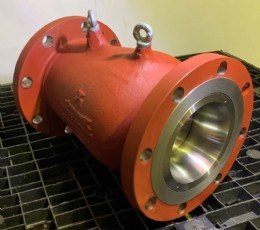Optimising check valve design through independent flow testing at UK National Flow Measurement Facilities

İMcAteer Photography

Check valves, or non-return valves, are a vital component of most process industries around the world.
For any valve manufacturer, it is important that they can effectively characterise the performance of their products, as end-users will ultimately use this information when selecting a valve for a specific process requirement.
One of the best ways of determining the performance characteristics of a valve is through independent flow testing.
It not only provides useful information on the pressure drop characteristics of a specific design, it can also be used to validate other important check valve parameters such as cracking pressure and critical velocity.
Abacus Valves, a UK engineering company with over 25 years experience in the design and manufacture of industry approved check valves, required independent pressure drop flow testing on one of their prototype nozzle check valve designs.
As the home of the UK National Standards for Flow Measurement, TÜV SÜD National Engineering Laboratory were enlisted to determine the pressure drop characteristics of their prototype design, which would validate their design calculations and provide independent benchmark data for future Computational Fluid Dynamics (CFD) simulations.
How did TÜV SÜD National Engineering Laboratory Help?
To facilitate this, testing of the nozzle check valve was performed at our UKAS-accredited Water Flow Laboratory [Laboratory No. 0009], which forms part of the UK National Flow Measurement Facilities.
The test installation was set up in accordance with Control Valve Capacity Test Procedure ANSI/ISA 75.02.01, the industry standard procedure for capacity testing control valves.
The check valve was tested at several flow velocities as specified by Abacus Valves, and the differential pressure, flowrate, downstream pressure and temperature were recorded at each velocity using our proprietary data acquisition system.
The Flow Coefficient (Cv), which describes the relationship between pressure drop and flowrate through the valve was then calculated for each test condition.
Additional straight pipe pressure drop measurements (equal to the valve installation length) were also recorded simultaneously during the Cv testing.
This enabled the pressure drop chargeable to the valve body alone to be determined, and a Loss Coefficient (K) to be calculated as per the Crane Flow Test Procedure.
Both Cv and K coefficients are important parameters when it comes to valve selection.
Impact
Upon completion of testing, TÜV SÜD National Engineering Laboratory supplied Abacus Valves with independent and traceable flow test data, providing a valuable benchmark for the design and development of their axial nozzle check valve range.
Scott Cook, Managing Director of Abacus Valves commented:-
TÜV SÜD National Engineering Laboratory was a stand-out choice for Abacus Valves to engage with for flow measurement on our axial non-slam check valve range.
The gravity of the organisations name in the UK engineering sector and their wealth of knowledge ensured that the essential laboratory work required to accompany our own in-house CFD and design methodology would be conducted with proven expertise.
The development of the product range now equates to the axial non-slam nozzle check valve contributing to approximately 25% of the companys annual turnover.
Valve flow testing can not only validate CFD modelling or existing design data, it can also highlight any potential areas of enhancement or improvement for a design for the manufacturers, and ultimately increase the confidence of end users in the product going forward.
Tel: 01355 220 222
Email: carl.wordsworth@tuv-sud.co.uk
Web: www.tuv-sud.co.uk/nel

Search related valve / actuator articles: TUV SUD National Engineering LaboratoryIssue 51Safety and StandardsTesting







-web.jpg)





